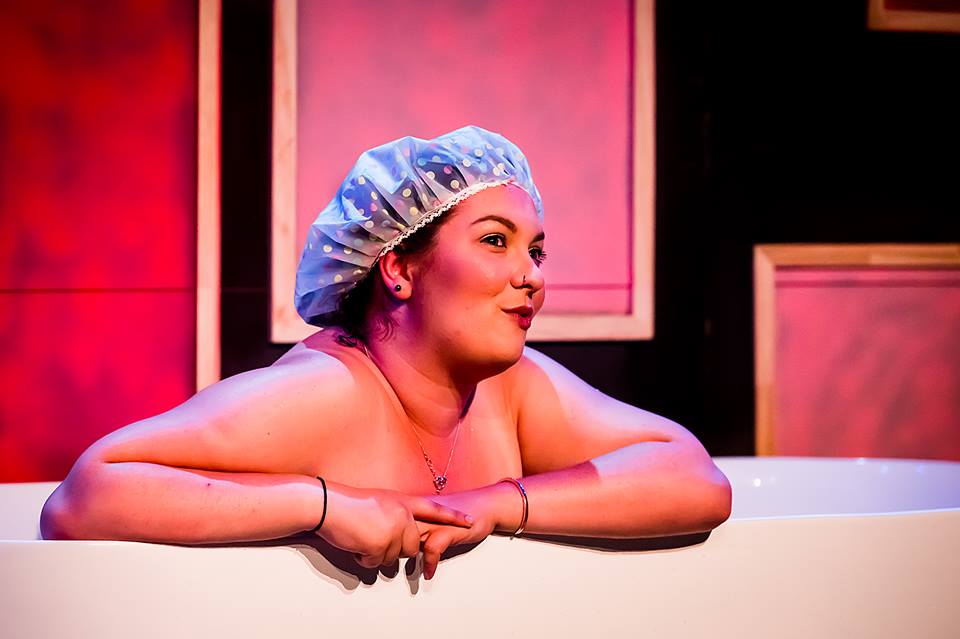Emilie Hope

The show surprisingly kept these too familiar stories fresh. For example, in one of Mary’s soliloquies, she describes sees a billboard ad with a gorilla grabbing a woman, one hand through her legs, and the other along her ribs with a thumb pulling off her bikini. Real advertisement or not, I was affected by the woman's vacant expression just as much as Mary. She wasn’t excited, or scared, or trying to retaliate. “She didn’t look like anything,” Mary explained. By pointing out how often women are depicted as blank, emotionless, and without agency, Mary regains control over her own autonomy. She demonstrates this further by dying a party dress blue, in which she felt like a “tart.”
It’s always incredibly difficult for a character like Mary to be introduced to the audience after going through the trauma of sexual assault and is in pain while she processes this. The script does not allow for us to know Mary pre-assault, it’s up to the actor to embody a character in which the audience should care for instantly. It seemed challenging for Glucina to vary her tone. Her volume remained the same during emotionally gruelling monologues and made it difficult for me to engage with her words. However, towards the end of the play, she found some redeeming qualities through her friendship with Jo, and her resolution to “dress how I feel” and she boasted the most impressive character development.
Despite Mary as our protagonist, Dean's performance was the clear crowd favourite. Dean brings Jo to life with her charismatic and extroverted performance. Dean has the body confidence of a queen. She opens the show by stripping down to her skin-coloured underwear and hoping into a bath. (Yas, gal, free the nipple!) Her consistent confidence captured the audience throughout the entire show. This would have been an absolute knockout performance if Dean was also able to deliver some more raw moments. When it came time for Jo to reveal some particularly toxic thoughts about her own body, I felt as though Dean could have given up the comedic façade even more so to allow herself more vulnerability to give the audience more insight into an emotionally complex character.
Celia did not have much impact on the narrative but provided much needed breaths from the severity of the subject matter by talking mostly about completely trivial things. While the script simply did not give her enough space to become a complex character, Christall did give us a good sense of who this character is which was not necessarily the way Jo saw her, believing her to be snooty and entitled, mouthing “bitch” at one stage.
Low Level Panic’s set, designed by Ethan Burmeister, unfortunately seemed unfinished and disjointed. A large false wall stands centre stage with pink frames among a black wall, reminding me of High Five. Its frames were begging to be interactive but disappointingly remained superficial. The pink paint was patchy, giving it an appropriate grungy look in their washing machine-less flat. The design was also awkward in areas. The crisp, white, modern bath wasn’t quite the right look for the time and the characters’ economic situation. (Kudos to Mico Bathrooms for lending it though!) It did take me a humorously long time to figure out that the slightly reclining white chair was the toilet – I mean, who has a reclining toilet?
Although the themes of the show are heavy, this was well balanced by a very eighties lighting palette, consisting mostly of pinks and blues, highlighting the gendered issues discussed in the play, and a banging soundtrack. A particular heartfelt, fun moment of the play was when Mary and Jo sing their rehearsed rendition of another Lauper masterpiece, Girls Just Wanna Have Fun, using deodorant and a hairbrush as microphones. This scene solidifies their friendship to the audience, and reminds us that Mary is just a girl who, at the end of the day, just wants to have fun. While Low Level Panic could easily be completely adapted for a New Zealand context, Barker made a wise choice in letting her cast keep their kiwi accents, even while they were using typically British slang like “tart” and “bloody”.
This was a solid debut directing performance from Barker, and I look forward to seeing her continue these feminist conversations.
Low Level Panic is currently showing at BATS Theatre until Saturday 9 February. It is a part of the 6 Degrees Festival, the final projects of MFA theatre students at Victoria University of Wellington. To book tickets, visit the BATS Theatre website. To find out more about the 6 Degrees Festival, visit their website.





